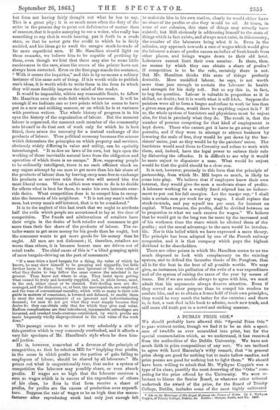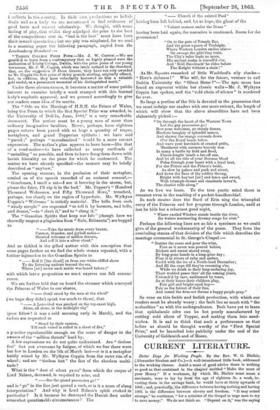A DUBLIN PRIZE ODE.'
WE should probably have allowed this '" Special Prize Ode" to pass without notice, though we find it to be as rich a speci- men of twaddle as ever scrambled into print, but for the special commendation which, as we understand, it has received from the authorities of the Dublin University. We have not much faith in prize compositioni of any sort. We are inclined to agree with Lord Macaulay's witty remark, that "in general prize sheep are good for nothing but to make tallow candles, and prize poems are good for nothing but to light them." We should have been willing to admit that Mr. Wylkyns Coppin's was a type of its class; possibly the most deserving of the " Odes" com- peting for the prize offered by the University. We were re- luctant to blame the Senior Board, or whatever other tribunal undertook the award of the prize, for the Board of Trinity College, Dublin, includes some of the most highly cultivated • Ode on the Marriage of His Royal Highness the Prince of Waisa By J. Wylkyas Coppin, of Trinity College, Dublin, de. DuUlln : Hodges, Smith, and Co. 1103.
htellects in the country. Iii their own productions as
indivi- duals and as a boly we are accustomed to find evidences of goad taste and correct scholarship. We thought, with some feeling of pity, that whilst they adjudged the prize to the best of the compositions sent in, "bad is the best" must have been their inward ejaculation ; but our pity was misplaced, for we read in a morning paper the following paragraph, copied from the Londonderry Standard TRINITY COLLEGE PRIZE POEM.—Me. J. W. COFFIN.—We are gratifi-d to learn from a contemporary that so highly pleased were the authorities of Trinity College, Dublin, with the prize poem of our young townsman, Mr. J. W. Coppin, which was lately noticed in the Standard, that, on the suggestion of Dean Graves, they have not only awarded to. Mr. Coppin the first prize of thirty pounds sterling, originally offered, but, in addition, they have voluntarily bestowed on him a valuable gold medal, as a permanent memorial of his distinguished merit."
Under these circumstances, it becomes a matter of some public interest to examine briefly a work stamped with this learned body's emphatic approval, and we proceed accordingly to give our readers some idea of its merits.
The " Ode on the Marriage of H.R.H. the Prince of Wales, being the Poem to which the first Special Prize was awarded, in the University of Dubin, June, 1863," is a very remarkable document. The author must be a young man of more than ordinary imaginative faculties. Never, perhaps, have eighteen pages octavo been paved with so huge a quantity of tropes, metaphors, and grand Tupperian epithets : we have said " paved ;" perhaps " macadamized " would be a more correct expression. The author's plan appears to have been—like that of a road-maker—to have collected as many cartloads of "Metalling" as possible, and then to have flung them down with lavish liberality on the piece for which he contracted. The matter we have already specified—the manner may be briefly described as " anyhow."
The opening stanzas, in the profusion of their metaphor, remind us of the speech recorded of an eminent counsel,— " Gentlemen, I smell a rat—I see it brewing in the storm, but, please the fates, I'll nip it in the bud." Mr. Tupper's " Hundred Thousand Welcomes, and Fifty Thousand More;" trenched, perhaps, too closely on the region of hyperbole. Mr. Wylkyna Ceppin's "Welcome'' is strictly material. The bells from each "windy steeple" are requested "to tell it by banners, and bells, and drums,"—to " clash it," and to " clang it."
The "Guardian Spirits that keep our Isle " (though here we shrewdly suspect a plagiarism from " Rule, Britannia") are begged to'
"—Take the music from every breeze, Cannon, thunderrsuld joybell notes— Shouted welcome of million throats, And roll it into a silver cloud."
And so tickled is the gifted• author with this conception that some pages further on we find the whole stanza repeated, with a further injunction to the Guardian Spirits to
" — Roll it [the cloud] on from our white-cliffed shore To the listening nations beyond the sea, Where [sic] never such music was heard before ;" wit!► which latt-..tr proposition we must express our full concur- rence.
'We are further told that on board the steamer which conveyed the Princess of Wales to our shores,
"— Genii stood by the men at the wheel" (we hope they didn't speak too much to them), that A Love-God was perched on the top-mast high, Alone, all alone, in the midnight sky"
(poor felloW ! it was a cold morning early in March), and the sailors are requested to
" Stand by their cannon, Till each vessel is rolled in a sheet of fire,"
a practice reprehensible enough on the score of danger to the owners of the " million throats" hard by.
A few expressions we do not quite understand. Are " tireless feet" feet not overcome by fatigue, of which we fear there were but few in London on the 7th of March last—or is it a metaphor boldly seized by Mr. Wylkyns Coppin from the outer rim of a wheel ; and are "tireless feet" the feet of the shoeless multi- tude?
What is the " dust of silent years" from which the corpse of Lord Nelson, deceased, is required to arise, and " —See the grand procession go! "
and is "go" in the line just quoted a verb, or is it a noun of slang interpretation? And why is Lord Nelson's spirit evoked in particular ? Is it because he destroyed the Danish fleet under somewhat questionable circumstances ? The
" — Church of the sainted Paul"
haVing been left behind, and, let us hope, the ,ghost of the
" Valiant seaman under the Dome "
having been laid again, the narrative is continued. Room for the procession !
"On to the gate of Temple Bar, And the great square of Trafalgar,
Where Western London smiles Afar— On sweeps the glitt'ring train. The City's ruler leads no more, His ancient realm is travell'd o'er, And Bold Buceleuch' he rides before
The Knight without a "
As Mr. Squeers remarked of little Wackford'is oily cheeks- " Here's richness!" Who will, for the future, venture to call Dublin University the "Silent Sister ?"— The epic muse has found an exponent within her classic walls—Mr. J. Wylkyns Coppin has spoken, and the "cold chain of silence" is sundered for ever.
So large a portion of the Ode is devoted to the procession that we must indulge our readers with one more extract, the length of which will show that the above absurdities have not been elaborately picked :-
" On through the heart of the Western Town
Let the gay procession go !
Bow your welcomes, ye stately dames, Heritors haughty of splendid names, And shower the orange coronals down O'er the Royal heads below.
And wave your kerchiefs of crested pride, 'Broidered with coronets bravely won In many a battle by field and flood, Fierce-fought 'neath a far-off sun.
And let all the tide of your Norman blood Pulse through your.heart with a loyal beat, For the Prince and the Prince's bride, As slow by palace and park and street, And down the lines of the soldier throng,
Bright with bay'net [sic] and lance and sword,
With triumph-drums and standards lower'd, The chariot rolls along."
As we live we learn. To the true poetic mind there is romance even in the marking of a pocket-handkerchief.
In such strains does the Bard of Erin 'sing the triumphal entry of the Princess and her progress through London, until at last he bids her a reluctant good night,
" Where castled Windsor stands beside the river,
Its waters murmuring dreamy songs for ever."
Perhaps the following lines are as fair a specimen as we could give of the general workmanship of the poem. They form the concluding stanza of that division of the Ode which describes the marriage ceremonial in St. George's Chapel•:—
" Scatter the roses and pour the wine,
Free as it never was poured before, Richest and rarest stored away, By long-gone hands in a long-gone day; Pour it in rivers of ruby and amber, Cool'd with the ice of a North-land December; And fill the cups till they're creaming o'er, While we drink to their long-enduring joy, Their wedded peace thro' all the coming years, Untouch'd by care, undimmed by tears, As at their knees their children play,
Fair girl and bright-eyed boy—
Fair as the fairest of their line, And round the firm-set throne a happy people pray."
So runs on this feeble and foolish production, with which our readers must be already weary ; the fault lies as much with the authorities " as with the undergraduates. Both have yet to learn that epithalamie odes can be but poorly manufactured by cutting cold slices of Tupper, and making them into sand- wiches. It is sad to think that such a performance as that before us should be thought worthy of the "First Special Prize," and be launched into publicity under the seal of the University of Goldsmith and of Moore.































 Previous page
Previous page